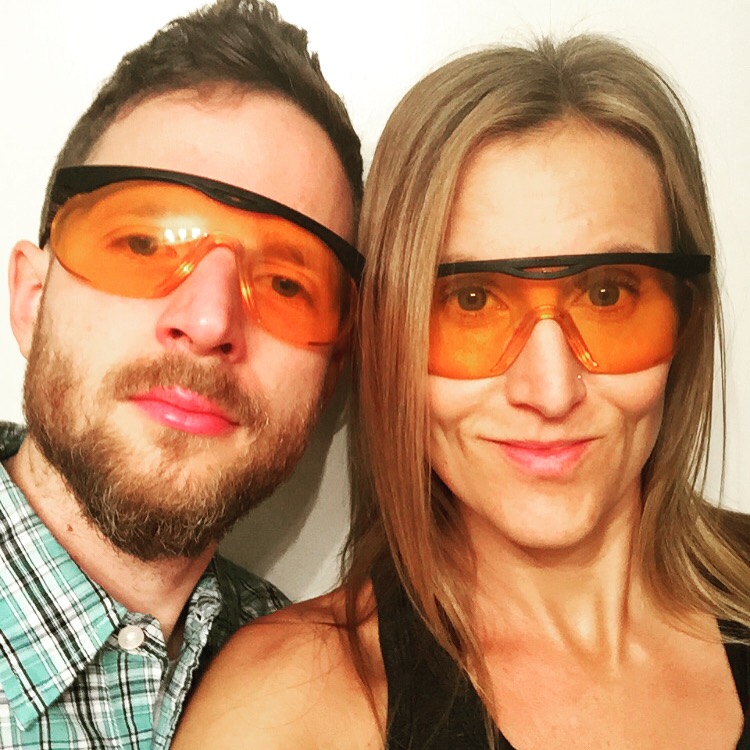This is the condensed version of this post. Click here for the full version with studies.
I LOVE SLEEP. As a recovered insomniac I have experienced firsthand the negative health effects of not sleeping- and the amazing rejuvenation a good night’s sleep can bring.
Sleep is one of the most important factors for good health and a life full of vitality. Research has shown that getting between 7 and 9 hours per night can relieve stress, improve memory and cognitive function, reduce the risk of many chronic diseases, and help with weight loss.
As our world changes to one focused on longer hours in front of the computer, looking at our phones, reading e-books instead of paper books and playing video games, our sleep cycles have been thrown off in a big way. This is because of the blue light emitted from electronic light sources.
So, what’s the deal with blue light?
The light-dark cycle is the most important synchronizer of the human circadian system.
Our sleep patterns are naturally based on the circadian rhythm which is signaled by the rising and setting of the sun. This goes back to pre-electricity days. When the sun rose, it was time to be awake and active. When it got dark it was time to rest and recover.
With the introduction of electricity, and screens that emit lights of blue wavelength, our circadian rhythm is thrown off. This is because the blue light generated from electronics mimics sunlight, thus tricking out bodies into thinking it’s still daytime.
As a result, the production of our sleep hormone, melatonin, is diminished. The dark of night signals the pineal gland in our brain to produce melatonin, so if we are looking at blue light, our body doesn’t recognize that it is night time, the pineal gland doesn’t secrete melatonin and we don’t get tired or fall into a deep, replenishing sleep.
The reduction of melatonin production has been shown to increase obesity, anxiety, metabolic disorders and depression.
Room light affects sleep as well.
It is not only screen light that affects our sleep. Electrical room lighting has been shown to have a profound effect on our quality of sleep. In our modern world we are exposed to bright room lights well into the night while participating in social activities or working.
Ideally, we should be shutting down all electronics and electric powered lights at least 2 hours before bedtime. But for many people, this just isn’t going to happen. Luckily there are ways to work around the blue light epidemic.
Bring on the amber glasses!
Blue light blocking glasses which are made with amber colored lenses simulate physiologic darkness by counteracting the short-wavelength of blue light. As a result melatonin production is not decreased and you will be able to enjoy a deep and restful sleep even if you don’t shut down at sunset.
As a former insomniac I have found that using amber tinted, blue blocking glasses has had a profound effect on my sleep quality and duration. Unless you are shutting off all lights, screens and not glancing at your phone after sunset, amber lenses are the way to go. I noticed an immediate change in the quantity and QUALITY of my sleep when I started using blue light blocking glasses.
I put them on as soon as the sun starts to set and wear them until I shut off my light to sleep. I fall asleep faster, have more vivid dreams, and wake up feeling more rested. I also notice a sense of calm as soon as I put them on.
There are some cheap options on Amazon that work great. My favorites are Swanies for nighttime and Gamma Ray Optics for when you are getting a bit too much screen time during the day.
Other ways to block out blue light at night are:
- Installing F.lux on your computer which will block out all the blue light and give it an orange hue
- Blackout curtains
- Eye masks
- Orange light bulb in reading lamp
- Use salt lamps which have an orange glow and clean the air
- Leave your phone in another room when you sleep to resist the temptation to look at it before bed and if you wake from sleep
Not all blue light is bad!
Something to keep in mind though is that not all blue light is bad- it’s WHEN we are exposed to blue light that is the issue. Blue light during the day is a necessity for energy, a sense of well-being and maintaining a proper circadian rhythm. Think about how you feel after a few cloudy, gray days compared to days full of sunshine.
Blue light is also used to manage depression, seasonal affective disorder (SAD) and mood disorders. So, like most things health related, it’s all about balance. So get outside and suck up those natural blue rays during the day and pop on your sexy amber glasses at night for the best night’s sleep.
Read the complete post with studies here.

comments